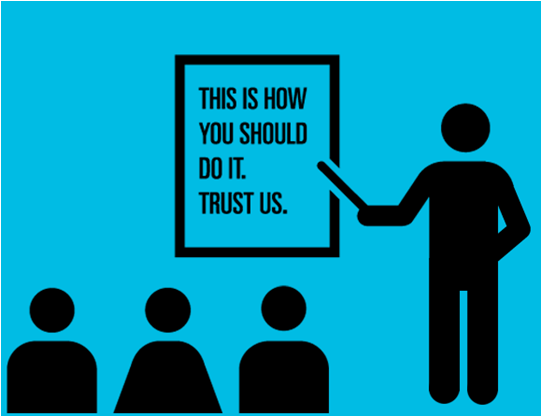
Marketing Agencies are for profit.
It’s in your best interest to be informed about what services they are providing.
And more importantly to be knowledgeable about things they haven’t told you.
Here are 20 top things you should be aware of when checking out your marketing agency.
1. Our sales pitch involved telling you everything you wanted to hear.
(How else was I supposed to get you to sign up?)
Last time I checked most marketers aren’t astronauts, so if your marketing agency sold you on the moon don’t expect to be arriving there any day soon.
What you can do about it: Ask your marketing agency to outline how they are going to reach the goals you’ve identified, and when.
2. We haven’t been doing this very long.
(How do you define ”expert”? I’ve been doing this for 3 months, so by my own definition… I’m an expert.)
A lot of companies focus on one central service but claim to be experts in other fields where they have limited experience.
What you can do about it: While Facebook stalking is frowned upon, I’m all about LinkedIn stalking. Make sure you do research on the company you’re hiring, AND the employees. Alternately, don’t be shy to ask about their experience and how long they’ve been in the industry.
3. We don’t check in on your nearly as often as we say.
(Hi! I’m you’re dedicated Account Manager. You are seller number #147 in my client list. I’ll be reaching out to you once every six months to make sure you’re alive and still paying us.)
Most companies are out to make a profit. More clients means more profit, so many Account Managers are stuffed to the gills with accounts that they will rarely check.
What you can do about it: Ask your Account Manager how many clients he has, and encourage regular contact with him to make sure things are getting done with your account.
4. Your results are NOT guaranteed.

This is ecommerce, nothing is guaranteed.* What type of performance you see is going to vary on what you sell, the market, seasonality, and a host of other variables.
What you can do about it: If a company is promising you an exact cost of sale or revenue run for the hills.
* Anything on the Amazon marketplace has a set cost of sale (COS), so results can be guaranteed in that sense, but you’re still going to have variability with the robustness of the tool you’re using (uptime vs. downtime, maintenance time), and the tools functionality (amount of time it takes for you to add or remove products, and maintain/ optimize your data and marketing campaigns).
5. We really have no experience messing with these data feed things. But since you don’t either it’s easy to fake it.
Data feeds are a big deal. Whatever product information you’re sending is in that data feed. You need to make sure you data feed is 1) formatted correctly 2) updating (fresh) and 3) optimized (product titles, descriptions).
What you can do about it: Be sure your agency is knowledgeable about feeds. Ask them when they started managing data feeds. Ask them how many data feeds they manage in total.
6. Our fees change.
(Oh you want more than the basics? You want me to do a specialized task? You’ve been with us for over 5 months? That’s gonna cost ya.)
Companies often charge their clients more after a set amount or time, or if you want more than just the basic services.
What you can do about it: Make sure you know what management fees are up front, if they’ll change and what services they cover.
7. We’re overcharging you.
(Of course we’re a great deal! Look at all the services you get! Sure there are cheaper options, but every company but ours is horrible!)
Many self-service management companies will charge high fees for just the use of software or limited management. Chances are you’re paying more than you need to, AND you need to do just as much work as you would without the tool.
What you can do about it: Be clear about what your fee gets you. Make sure you understand what services you’re getting, test them out to see if they’re usable for you and fit your workflow, and shop around to see if they’re reasonable.
8. You can find a ton of information for free on the internet.
(I actually put a lot of that information out there marketing my own services.)
You can learn how to do almost anything on Youtube, and companies are constantly turning out ebooks, webinars and blog posts that are designed to inform online merchants.
What you can do about it: If you have the time and the initiative, you should read up on different areas of marketing, so you are knowledgeable, and also to make sure your agency is on its game.
The easiest way to know if you have a good source is to ask a trusted friend what they use for news. Also, and this is a big also – best practices are just rules of thumb and are extremely risky to follow like a zombie. Find what works for your store. Usually, it’s a custom solution that won’t fit the mold of any other company but yours. One-size-fits-all solutions are rarely the right answer.
9. ‘Norms’ aren’t the best gauge of performance.
(Oh yeah, your numbers are totally normal for merchants like you!)
Everyone always wants to know how they compare to the average. Especially in ecommerce, this just isn’t a realistic way to gauge performance.
What you can do about it: Be familiar with Google Analytics, and track your sales data to draw conclusions about performance. Focus on tracking, analyzing and improving where you improve over time, and find and fix where you’re weak. This video on prioritization is a good place for you to start.
10. Every company is unique.
(Oh yeah we can TOTALLY get your company to perform just like that really popular brand over there!)
Your online store isn’t going to magically become just like Zappos. Not gonna happen. Every online store is different and will see different performance.
What you can do about it: Don’t compare yourself to other online stores. Work on your product, services and site. Analyze your sales and make changes based on customer feedback, sales, and marketing strategy.
It’s hard on the internet because you’re meeting people over a phone call, and a lot of them want to tell you yes. Yes we can do this. Yes we can do that. But keep an eye out for a No.When a company tells you no, it’s a good indicator that they know their strengths and weaknesses and don’t want to waste your time.
Also a company that takes their due diligence to find out the key factors about your business (number of products, category, AOV, conversion rates, best sellers, top sales channels, etc) is another sign of a company that wants to find a right fit between their services and your company.
11. Results aren’t going to happen over-night.
(We’ll double your money in 2 days!)
Things take time. Any strategy should be looking at a time period of two weeks at the minimum.
What you can do about it: Be sure to look at a longer time period when making changes to your account.
12. You need help in another area of your marketing.
(We don’t know much about these areas, and don’t offer these services… so let’s just not talk about them.)
Online marketing encompasses a lot. Landing Page optimization (LPO), Search Engine Optimization (SEO), and Site Speed are just some of various marketing elements you should be addressing. Marketing agencies can be shy about admitting there are areas which they aren’t knowledgeable about. But that doesn’t mean your site couldn’t use some help within those spaces.
What you can do about it: Get feedback about your site and products to determine if and where your site needs improvement.
13. We aren’t really that widely recognized.
(Umm hello have you met us? We’re awesome!)
There are a TON of companies out there hawking the same services.
What you can do about it: Do your due diligence.
14. We say we do more than we do.
(Oh you want help with THAT? Yeah that’s not really part of our service offering, I think you read that wrong.)
Looking at a marketing agency webpage I came across this marketing pitch: “We meet your customers everywhere they’re shopping!” Really? Everywhere? Somehow I think that’s an oversell.
What you can do about it: Understand what it is your agency can do, and CAN’T.
15. We don’t actually do everything.
(We do everything!)
Some marketing agency service pages are a laundry list of services the company supposedly does for their clients. While it’s good to have a knowledgeable marketing agency, I’d rather have someone who was very knowledgeable about a limited number of things instead of marginally knowledgeable about a whole host of marketing strategies.
You just can’t do everything. Agencies can’t do everything. And if they say they are, chances are they’re not doing it well.
16. We haven’t seen every type of client.
( We’ve seen it all man!)
I don’t care long you’ve been a marketing , you haven’t seen every type of online merchant. The market is just too varied and there are so many niche selling categories.
17. Our referrals aren’t that great.
(We get $300 for every client we refer to these guys!)
It’s common practice for marketing agencies to offer you services from other companies. These referrals can be helpful if you need help with other services, but often aren’t in your best interest.
What You can do about it: Be aware that 1) You may not actually need those services and 2) Often agencies get kickbacks for referrals, so the company they recommend may not be your best choice.
18. You need to be working on your campaign all the time.
(We don’t check in on your account very often, so if you don’t either its good for us.)
Ecommerce performance is nothing if not variable. Traction and sales are going to fluctuate depending on the season, demand, your competitors actions, etc. You need to be constantly on top of your marketing campaign strategy.
19. Here are our weaknesses.
(What weaknesses?)
A company which tells you where they are not experts honestly is a company to hold on to.
20. You really shouldn’t be on comparison shopping engines, or AdWords, but you’re paying us, so…
(Turn someone away? What?!)
Focus is really important for online marketing. It’s not the best idea to spread yourself too thin (with time, resources) for instance if you’re on every outlet (e.g every social media site). Do a limited amount, and do it well.
Moreover, sometimes you’re just not going to be a good fit for an area of marketing. Agencies which are straight forward about what ISN”T a good fit for your store are keepers.
What you can do about it: Understand your product mix. For example, a product mix of less than 100 will probably not work very well on comparison shopping engines. Invest your time in things which will have a good return on investment.
You Might Be Interested In














